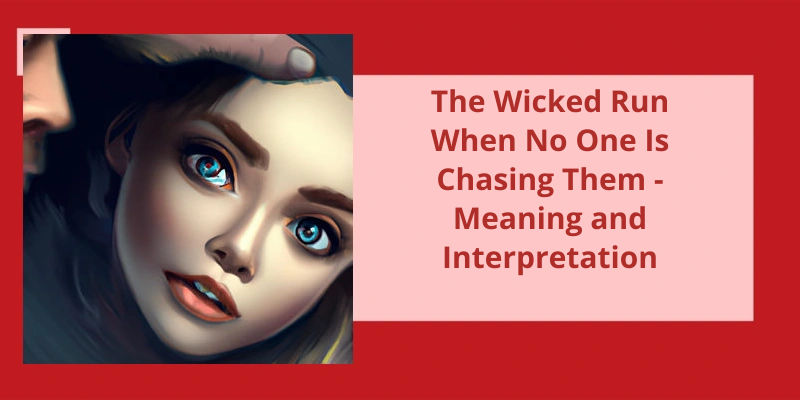The saying that "the wicked run when no one is chasing them" holds a profound truth that’s stood the test of time. This verse from Leviticus speaks to the reality that when people go astray and indulge in wicked behavior, they lose their sense of security and become paranoid. Their consciousness is plagued by guilt and an inherent sense of vulnerability that causes them to flee even when no one is pursuing them. The fear of being exposed and the anticipation of the consequences of their wrongdoing makes them run in a panicked state of mind. This reflects the impact of sin on the human psyche and the desperate measures that people take to protect themselves from the fallout of their actions. The wicked run not from the physical threat of danger but from the perceived threat of punishment that haunts their thoughts. This proverb is a call to embrace righteousness and shun evil lest one falls into the trap of running aimlessly without direction or purpose.
Where in the Bible Does It Say the Wicked Flee When No Man Pursueth?
Proverbs 28:1 is a powerful and often quoted verse from the Bible that speaks to the nature of righteousness and wickedness. The verse reinforces the belief that individuals who engage in wicked behavior are often plagued with fear, paranoia, and anxiety, even in situations where there’s no real threat or danger. The righteous, on the other hand, approach life with a sense of boldness and assurance, even in the face of adversity.
The passage can also be interpreted to suggest that wickedness isn’t sustainable in the long run. Those who engage in immoral or unethical behavior may experience temporary success, but ultimately will face consequences for their actions. This is supported by Proverbs 11:21, which states, “Be sure of this: The wicked won’t go unpunished, but those who’re righteous will go free.”
The idea that the wicked flee when no one pursues also speaks to the power of guilt and shame. When individuals engage in sinful behavior or wrong others, they may become consumed by their own sense of wrongdoing, causing them to feel paranoid and anxious even in situations where there’s no real threat. In contrast, the righteous can approach life with a sense of peace and clarity, knowing that they’re living in accordance with God’s will.
This passage also speaks to the concept of perception vs. reality. The wicked may feel as though they’re constantly being pursued because of their guilty conscience, but in reality, there may be no actual threat. On the other hand, the righteous may appear fearless even in the face of danger, because they’re grounded in their faith and know that they’re protected by a higher power. This reinforces the idea that perception isn’t always accurate, and that we must rely on God’s wisdom and guidance to navigate the complexities of life.
It reinforces the idea that the righteous are always better off in the long run, and that engaging in immoral or unethical behavior only leads to fear, guilt, and anxiety. By living according to God’s will and striving for righteousness, we can find a sense of peace and purpose that can’t be found through any other means.
The phrase, “the wicked flee when none pursueth,” is a biblical quote that speaks to the fear and paranoia that can haunt those who know they’re living immorally. It’s a reminder that when we stray from what’s right, we become vulnerable to our own fears and anxieties, and may end up fleeing from threats that exist only in our own minds.
Where Does the Phrase the Wicked Flee When None Pursueth Come From and What Does It Mean?
The phrase “the wicked flee when none pursueth” comes from the Bible, specifically from the book of Proverbs. It’s a warning against giving in to fear and anxiety when one knows they’re doing wrong. The idea is that wicked people often feel guilty and paranoid, even when there’s no actual threat or danger. They live in constant fear of being caught, and this fear can cause them to become irrational and flee even when no one is chasing them.
This phrase is also used in modern times to describe the behavior of people who’re being overly cautious or paranoid for no apparent reason. For example, someone who’s constantly checking their phone or looking over their shoulder could be said to be “fleeing when none pursueth.”. The phrase is often used to suggest that the person is behaving irrationally or out of fear.
In addition to it’s use in Proverbs, the phrase has been referenced in literature and popular culture. For example, it appears in Shakespeares play “Henry IV Part 2,” where Falstaff quotes it to Prince Hal as a warning against cowardice. It’s also been referenced in the works of authors such as Nathaniel Hawthorne and George MacDonald.
Source: What’s meant by this statement in Proverbs 28:1 ‘The …
Conclusion
In essence, the proverbial saying that the wicked run when no one is chasing them highlights the consequences of living an ungodly life. It demonstrates how sin can lead to a state of paranoia, fear, and constant inner turmoil. The message is clear, that we must strive to live a life that’s pleasing to God and resist the temptation to give in to our sinful desires, for when we do, we lose sight of what truly matters, and our minds become clouded with doubt and fear. So, let’s heed the words of Leviticus 26:17,36 and remember to always seek God's guidance and live a life filled with love, kindness, and compassion towards others.






